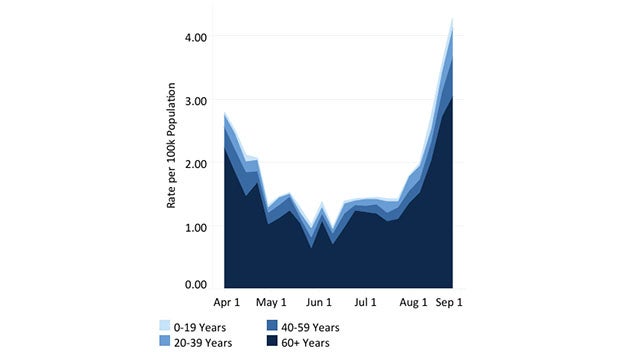COVID testing: How do you get tested?
Published 6:00 am Saturday, September 11, 2021
|
Getting your Trinity Audio player ready...
|
Uh-oh. Your mother or father tested positive for COVID-19. Should you get tested?
If you haven’t been vaccinated, your risk of infection and getting sick is very high. If you have been vaccinated, your risk of infection is high, but your risk of getting sick is extremely low.
Either way, if infected, you can pass the virus on to others. Some of these people may get very ill — even die. If you are a close contact of someone with COVID-19, you should follow Virginia Department of Health advice about quarantining and testing. Testing is one way to avoid spreading this life-threatening disease.
Where can you get tested?
Tests are offered at:
- Pharmacies
- Urgent care centers
- Some nonprofit health care services
Please visit the Virginia Department of Health for a list of COVID-19 testing sites near you. Tests are usually by appointment only. Drive-thru tests are available at many pharmacies and Walmarts. Search “drive up COVID testing” and your city for a list in your area.
Do not go to a hospital emergency room for your test. The emergency room is for true medical emergencies.
What happens in a drive-thru test?
Just like an in-office appointment, schedule your drive-thru appointment in advance. In general, when you get to the testing site, remain in your vehicle with the window rolled up. Show your confirmation email, a valid state ID or driver’s license and your insurance card or voucher. You will perform the nasal swab yourself under the direction of a pharmacy team member. Children ages 3-18 will need a parent or legal guardian present while they administer the test.
Which COVID test should you get? PCR? Rapid test? Antibody test?
The PCR test is the gold standard for detecting active infection, but test results often take longer to come back — a few days if they use an off-site lab; just a few hours if there’s an in-house lab.
The rapid (antigen) test is faster, but it’s not necessarily as accurate or sensitive. A false positive, in which you’re told you have COVID-19, but you don’t, will lead to unnecessary anxiety. A false negative, in which you’re told you don’t have COVID-19 but you do, can lead to delayed treatment and unintentionally passing the virus on to others.
What about the antibody test?
The antibody test can provide information about prior exposure to COVID-19 or vaccination. An antibody test should not be used to diagnosis acute infection. Also, a negative antibody test does not mean someone did not respond to vaccination.
Do you need to self-quarantine while awaiting your test results?
This depends on whether or not you’ve been vaccinated. The Centers for Disease Control and Prevention (CDC) recommends that:
- If you are fully vaccinated, you do NOT need to self-quarantine unless you have symptoms. The CDC recommends testing 3-5 days after exposure and wearing a mask in indoor public settings for 14 days or until your testing is negative.
- If you are not fully vaccinated, you DO need to self-quarantine.
What should you do if you test positive?
- Follow Virginia Department of Health guidance
- Stay home for 10 days since your first positive COVID-19 test, as long as you continue to have no symptoms (asymptomatic).
- Watch for fever (100.4◦F), cough, shortness of breath or other symptoms of COVID-19. Call your doctor if you have any of these symptoms.
- If possible, stay away from the people you live with, especially people who are at higher risk for getting very sick from COVID-19. Follow VDH advice.
If you were tested at VCU Health, learn more about how you get your results and what you should do in “You’ve been tested for COVID-19. Now what?”
If you test negative, can you resume normal activities?
Test results can be negative early in infection. If you are unvaccinated, self-quarantine for the full 14 days from the time of last contact with the person having COVID-19. See VDH guidance for test-based strategies to leave quarantine earlier.
For a variety of news and information on COVID-19 and how VCU Health is keeping you safe, visit its COVID-19 News Center.


